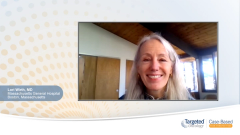
Treating Patients With BRAF V600E Mutation and Advanced RAI-Refractory DTC
An expert on thyroid cancer provides insights on treating patients with advanced RAI-refractory DTC who harbor BRAFV600E mutations.
Episodes in this series

Case: A 64-Year-Old Woman with DTC
Initial presentation
- A 64-year-old woman presents with a painless “lump on her neck” with occasional swelling. She states she noticed this just a few days after returning from vacation.
- PMH: Hyperlipidemia managed with medication; COPD
- PE: palpable, non-tender solitary right-of-the midline neck mass; mobile supraclavicular mass on the same side; otherwise unremarkable
Clinical workup and initial treatment
- Labs: TSH WNL
- Ultrasound of the neck revealed a 3.3-cm suspicious right mass in the lobe of the thyroid; 2 suspicious supraclavicular lymph nodes (LNs), largest 2.0 cm in size.
- Ultrasound-guided FNAB of the thyroid mass and the largest LN confirmed papillary thyroid carcinoma.
- Patient underwent total thyroidectomy with central compartment node dissection and right selective neck dissection.
- Pathology: 3.0-cm papillary thyroid cancer, columnar cell variant; 4/14 lateral positive LN, 3/3 central positive LN
- Largest lateral node was 2.2 cm with no extra-nodal extension
- Margins were negative
- Microscopic extrathyroidal extension present
- Probable stage II; T2N1bM0 papillary thyroid cancer
Subsequent treatment and follow-up
- She was treated with radioactive iodine 150 millicuries
- Whole body scan showed uptake in the neck, consistent with remnant thyroid tissue
- She was started on levothyroxine suppression therapy
- Follow-up at 6 months
- TSH 0.1 µU/mL, thyroglobulin 24 ng/mL (negative anti-thyroglobulin antibodies)
- Chest CT scan showed 8 small bilateral lung nodules only several mm in size
- Next-generation sequencing was negative for mutations, rearrangements
- Follow-up CT chest scan and blood tests 3 months later
- Thyroglobulin increased
- Lung nodules had increased by up to 1 cm in size
- Lenvatinib 24mg po qd was initiated
This is a video synopsis/summary of a Case-Based Peer Perspective featuring: Lori Wirth, MD.
Wirth discusses her treatment approach for patients with BRAF V600E mutation–positive, radioactive iodine (RAI)–refractory papillary thyroid cancer (PTC). She uses lenvatinib as her first-line drug of choice based on the SELECT trial results, which showed that patients with BRAF V600E mutations benefited from lenvatinib treatment in terms of response rate and progression-free survival (PFS), similar to patients with BRAF wild-type disease.
A multicenter National Comprehensive Cancer Network phase 2 trial investigated dabrafenib with or without trametinib in patients with BRAF V600E mutation–positive, RAI-refractory PTC. The objective response rates were 30% to 35%, and the PFS ranged from 10.7 to 15.1 months. Although a direct comparison cannot be made, the results do not appear as robust as those seen with front-line lenvatinib.
An ongoing international phase 3 trial is investigating dabrafenib plus trametinib compared with best supportive care in patients with second-line progressive BRAF V600E mutation–positive PTC. Wirth thinks this trial will provide important data on the effectiveness of dabrafenib and trametinib in the second-line setting. Based on the FDA approval for dabrafenib and trametinib as tissue-agnostic therapy in patients with BRAF mutation–positive solid tumors without alternative options, using these agents in the second line is a reasonable approach if clinical trial enrollment is not available.
Video synopsis is AI-generated and reviewed by Targeted Oncology® editorial staff.




















